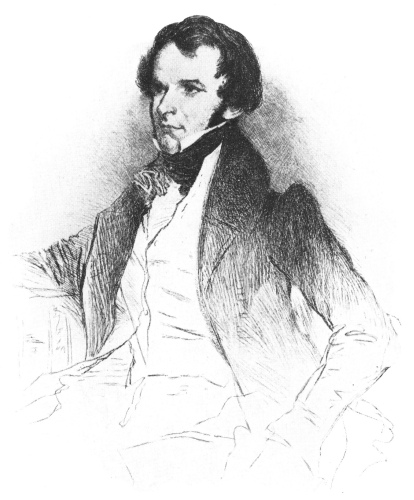
| Every attempt has been made to replicate the original as printed.Some typographical errors have been corrected; a list follows the text. The footnotes follow the text.Links to the numbered letters follow the text. (etext transcriber's note) |
WORKS OF
PROSPER MÉRIMÉE
EDITED BY
Prof. GEORGE SAINTSBURY, M.A.
LETTERS TO
AN UNKNOWN
BIGELOW, BROWN & CO., Inc.
NEW YORK
Copyright, 1905
By FRANK S. HOLBY
———
All Rights Reserved
PRINTED BY C. H. SIMONDS COMPANY BOSTON, MASS., U. S. A.
PROSPER MÉRIMÉE
I MET Mérimée frequently in society. He was a tall man, erect in hisbearing, pale, and, excepting his smile, had the appearance of anEnglishman; he had, at all events, that cold, distant manner whichforbids in advance any attempt at familiarity. Merely to see him one wasimpressed by his callousness, either natural or acquired, by hisself-control, by his determined self-repression. On ceremoniousoccasions, especially, the immobility of his countenance wasconspicuously manifest.
Even in the society of his intimate friends, and when relating a wittyanecdote, his voice retained its habitual calmness and tranquillity,with never an outburst, never a sign of enthusiasm. The drollest detailshe described in the most precise language, in the tone of a man askingfor a cup of tea. All evidences of sensibility he had mastered until itseemed a quality absent from his nature. Not that it was so—quite thecontrary; but race-horses there are so well trained that, once undertheir master’s hand, they never so much as make a sudden start.
His training, it must be said, had begun early. When ten or eleven yearsold, I imagine, having committed some impropriety, he was scoldedseverely and sent from the room. Weeping and in great distress, he wasjust closing the door when he heard laughter within the room, and someone said: “Poor child! he believes we are really angry with him!”Intolerable to him was the idea of being a dupe, and he resolvedthereupon to overcome a sensitiveness which had caused him suchhumiliation. He kept his word. “Remember to mistrust,” such was hismotto.
To guard against every manifestation of pleasure, never to abandonhimself unreservedly to the expression of emotion, to be tricked neitherby others nor by himself, in his conduct and his writings to have inview the constant presence of an unsympathetic, mocking spectator; to behimself that spectator—these are the most distinguishingcharacteristics of his nature, of which every phase of his life, of hiswo
